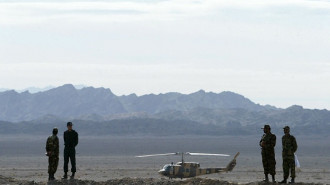Tunisian authorities accused of 'obliterating criminal evidence' of migrant boat tragedy
Tunisians have accused local authorities of covering up the reason behind migrant deaths, according to reports.
Locals say authorities could be attempting to "obliterate features of a crime", after a boat carrying 18 migrants from Zarzis city sank after departing from Tunisian shores on 21 September, Al-Araby Al-Jadeed reported.
The boat sank 28 miles away from Tunisian shores, according to sailors' estimates, after attempting to reach Italy.
Locals believe authorities tried to cover up the incident by spreading a rumour about the migrants being detained in Libya, without providing further details on the number of survivors or their identities.
However, activists say that they searched for the migrants in Libyan prisons and detention centres in coordination with Libyan fisherman, but found no traces of them.
Tunisian authorities also reportedly buried three of the suspected migrants’ bodies without conducting forensic analyses or trying to contact their families, which has raised suspicions of their involvement – alongside a wave of anger and protests in the country.
"The authority's involvement in withholding the truth makes it the subject of a direct accusation. The authorities deliberately buried the victims without conducting the necessary analyses. It appears as an attempt to obliterate the features of a crime," civil activist Ali Kniss told Al-Araby Al-Jadeed.
Feeling "let down" by local authorities, and their alleged lack of cooperation, locals and fishermen have taken it upon themselves to search for the missing bodies, Seafarers' Association head , Shams El-Din Bourasin told Al-Araby Al-Jadeed.
The sailors found eight bodies – five of which were buried after identification and three of which are awaiting DNA analysis, Al-Araby Al-Jadeed reported fisherman Bashir Al-Zawari as saying.
A long-running economic crisis has pushed many Tunisians to attempt migrant journeys.
According to official figures, more than 22,500 migrants have been intercepted off the Tunisian coast since the start of the year, around half of them from sub-Saharan Africa.

![Palestinians mourned the victims of an Israeli strike on Deir al-Balah [Getty]](/sites/default/files/styles/image_684x385/public/2024-11/GettyImages-2182362043.jpg?h=199d8c1f&itok=xSHZFbmc)


![The law could be enforced against teachers without prior notice [Getty]](/sites/default/files/styles/image_684x385/public/2178740715.jpeg?h=a5f2f23a&itok=hnqrCS4x)
 Follow the Middle East's top stories in English at The New Arab on Google News
Follow the Middle East's top stories in English at The New Arab on Google News
![Fakhrizadeh [AFP] Fakhrizadeh [AFP]](/sites/default/files/styles/image_330x185/public/media/images/774C39F7-8F7A-4D67-B998-27D102FCB4A7.png?h=d1cb525d&itok=j9eGvunV)

